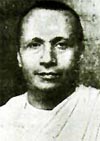Jaishankar Prasad facts for kids
Quick facts for kids
Jaishankar Prasad
|
|
|---|---|
 |
|
| Born | 30 January 1889 Benares, Benares State, British India |
| Died | 15 November 1937 (aged 47) Benares, Benares State, British India |
| Occupation | Novelist, playwright, poet |
| Notable works | Kāmāyanī (1936) |
| Parent | Babu Devki Prasad (father) |
Jaishankar Prasad (born January 30, 1889 – died November 15, 1937) was a very important writer in modern Hindi literature and Hindi theatre. He used "Prasad" as his special writing name, also known as a pen name. People also called him Chhayavadi kavi, which means a poet of the Chhayavad style.
Contents
Prasad's Poetic Style
Prasad began his journey as a poet using the pen name 'Kaladhar'. His first collection of poems, called Chitradhar, was written in an older form of Hindi called Braj dialect. Later, he started writing in a more modern form of Hindi, which was closer to Sanskrit.
Prasad helped create a new style of writing in Hindi literature called 'Chhayavad'. This style is often compared to Romanticism in English literature.
He is seen as one of the "Four Pillars" (Char Stambh) of this Romantic style in Hindi. The other three famous writers in this group were Sumitranandan Pant, Mahadevi Verma, and Suryakant Tripathi 'Nirala'.
Prasad's poems often used words from Sanskrit, an ancient Indian language. He wrote about many different topics, from love stories to patriotic feelings for his country.
Dramas and Other Writings
Prasad's plays are considered very important and groundbreaking in Hindi theatre. His most famous plays include Skandagupta, Chandragupta, and Dhruvaswamini.
Many young readers enjoy his plays because they teach us about the exciting history of Ancient India. Most of his dramas are based on real historical events from India's past. Some also tell stories from ancient Indian myths.
In the 1960s, a professor named Shanta Gandhi helped bring Prasad's plays back into the spotlight. She successfully staged his important play Skanda Gupta, showing that his works were still powerful and relevant for modern Indian theatre.
Major Works
Jaishankar Prasad wrote many different kinds of works, including poetry, plays, and novels.
Poetry Collections
- Kānan kusum (The Forest Flower) (1913)
- Mahārānā kā mahatv (The Maharana's Greatness) (1914)
- Jharnā (The Waterfall) (1918)
- Ānsū (The Tear) (1925)
- Lahar (The Wave) (1933)
- Kāmāyanī (a long poem about Manu and a great flood) (1935/36)
- Prem pathik (The Love Wanderer) (1914)
- Aatmkathya (Autobiography)
Famous Plays
- Ek Ghoont (A Sip)
- Skandagupta (About Emperor Skandagupta)
- Chandragupta (About Emperor Chandragupta Maurya)
- Dhruvasvāminī
- Rajyashrī (Royal Bliss)
- Ajatashatru
- Janmejay ka Naag-Yagy
Story Collections
- Aandhī
- Pratidhvani (The Echo)
- Akashdeep (Internal Lamp)
- Indrajāl (Hypnosis)
- Sandeh (Doubt)
- Daasi (Maid)
- Chitra Mandir
- Rasiya Balam
Novels
- Kankal (The Skeleton)
- Titli (The Butterfly)
- Iravati (This one was not finished)
Poetic Drama
- Karunalay
Legacy and Influence
Jaishankar Prasad's epic poem Kamayani (1936) is a very famous work in Hindi literature. It is considered a masterpiece of the Chhayavadi style of poetry. This poem greatly influenced the new wave of Romanticism in Hindi writing.
See also
- List of Indian writers

